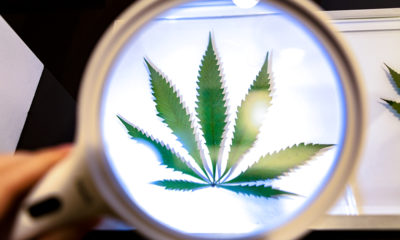
Medical
Study Finds CBD May Actually Worsen Glaucoma
New research indicates that while THC helps fight glaucoma, CBD has the opposite effect — and could even counteract the efficacy of THC.
Perhaps one of the most widely known uses of medical marijuana is to treat glaucoma.
Research going all the way back to the 1970s shows that THC, the psychoactive cannabinoid in marijuana, alleviates intraocular pressure, a key contributor to the optic nerve-damaging disease.
But a study from researchers at Indiana University now finds that CBD — the non-psychoactive cannabinoid currently the subject of intense interest by the medical community — may actually worsen the interocular pressure that leads to the disease.
The study, released this month in the journal Investigative Ophthalmology & Visual Science, contradicted the widespread assumption that CBD is essentially neutral where glaucoma is concerned.
“Far from inactive, CBD was found to have two opposing effects on ocular pressure, one of which involved antagonism of tonic signaling,” the study authors wrote in an abstract summing up their findings. “CBD prevents THC from lowering ocular pressure.”
CBD and Gender: Two Previously Hidden Factors
“This study raises important questions about the relationship between the primary ingredients in cannabis and their effect on the eye,” research team leader Alex Straiker of the IU Bloomington College of Arts and Sciences told the medical news site MDLinx.
“It also suggests the need to understand more about the potential undesirable side effects of CBD, especially due to its use in children.”
The study, which was carried out on mice, found that THC caused a drop in eye pressure for 30 percent of subjects, lasting up to eight hours. On the other hand, CBD caused an increase in pressure inside the eyes of 18 percent of subjects for at least four hours after application.
Another surprising result of the study is an apparent role for gender in how effective THC is at relieving interocular pressure. Male mice experienced a drop in eye pressure of nearly 30 percent for eight hours after exposure to THC alone. A lower pressure drop of 22 percent was observed after four hours in male mice. For reasons not entirely clear, the effect was found to be weaker in female mice — they experienced a pressure drop of only 17 percent after four hours, with no difference seen after eight hours.
“This difference between males and females, and the fact that CBD seems to worsen eye pressure, the primary risk factor for glaucoma, are both important aspects of this study,” Straiker told Science Daily. “It’s also notable that CBD appears to actively oppose the beneficial effects of THC.”
Important Cannabinoid Receptors Identified
The IU researchers also succeeded in identifying two specific neuroreceptors — dubbed CB1 and GPR18 — by which THC impacts interocular pressure. This is a significant breakthrough aside from the findings about CBD and the gender difference: another addition to the mounting knowledge of cannabinoid receptors that can explain how these compounds work their seeming magic.
“There were studies over 45 years ago that found evidence that THC lowers pressure inside the eye, but no one’s ever identified the specific neuroreceptors involved in the process until this study,” Straiker told Science Daily. “These results could have important implications for future research on the use of cannabis as a therapy for intraocular pressure.”
Summing up the study’s findings in an interview with Medical Research website, Straiker first issued sobering words for the fast-growing ranks of CBD-enthusiasts: “There is a real possibility that CBD elevates ocular pressure and therefore the risk of glaucoma as a side-effect. This is significant given the widespread (and growing) availability of CBD and its recent FDA approval as a treatment for Dravet’s Syndrome.”
That’s a reference to the recent Food & Drug Administration thumbs-up for Epidiolex, a CBD-based pharmaceutical used to treat severe forms of epilepsy, such as Dravet’s.
This IU study may loan credence to the perception that the health benefits of THC are being overlooked amid the current CBD-mania. It also gives a sense of a window just opening on our understanding of how cannabinoids interact with the human organism, and how this knowledge can be harnessed by science.
TELL US, do you think the medical usefulness of CBD has been overblown?























